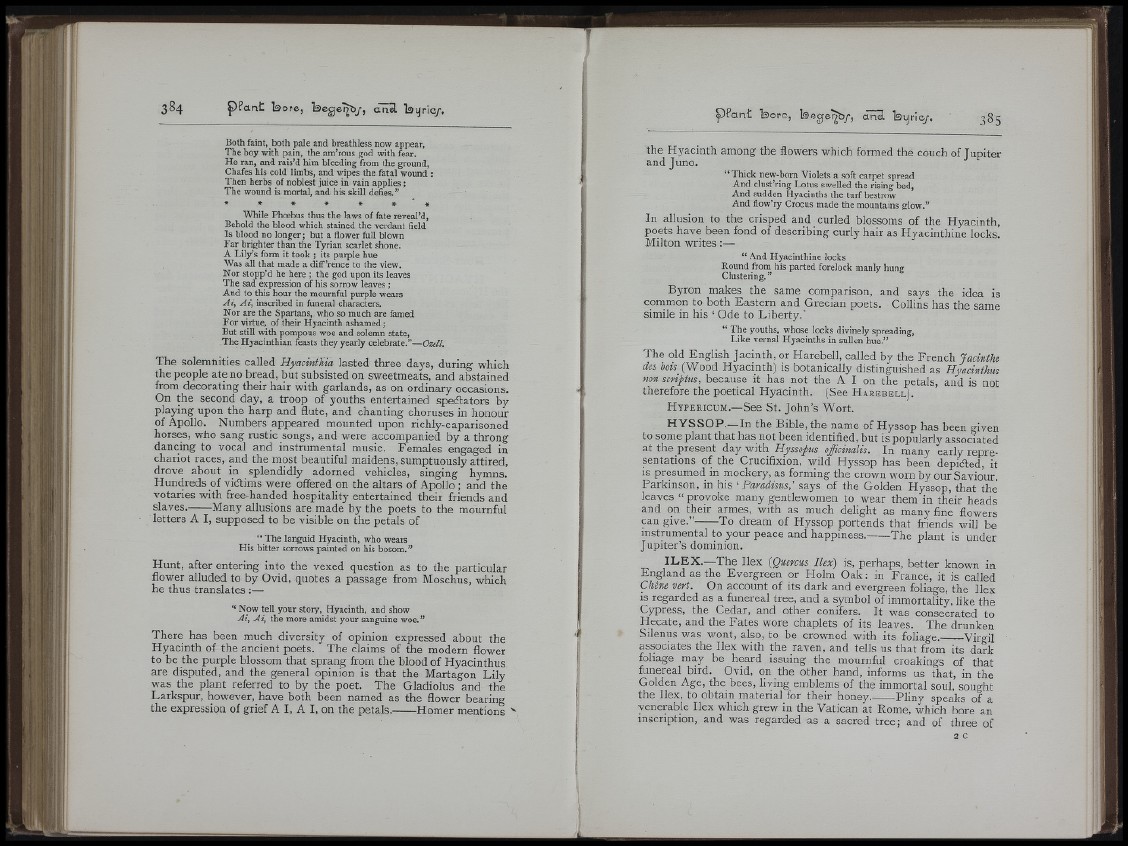
T
!
î -
Í. î.i.i
i J
ii
F!
il' 4 M'il
M
r•r i 'I !1
/’: . ^ : Ii
n"-
;■ i
3 8 4 p f a t i t k o r e , b e g e r ^ / , a n i. bijri(y.
Both faint, both pale and breathless now appear,
The boy with pain, the am’rous god with fear.
He ran, and rais’d him bleeding from the ground,
Chafes his cold limbs, and wipes the fatal wound :
Then herbs of noblest juice in vain applies;
The wound is mortal, and his skill defies.”
* * * * * * ' *
While Phoebus thus the laws of fate reveal’d,
Behold the blood which stained the verdant field
Is blood no longer; but a flower full blown
Far brighter than the Tyrian scarlet shone.
A Lily ’s form it took ; its purple hue
Was all that made a diff’rence to the view.
Nor slopp’d he here ; the god upon its leaves
The sad expression of his sorrow leaves ;
And to this hour the mournful purple wears
A i, At, inscribed in funeral characters.
Nor are the Spartans, who so much are famed
For virtue, of their Hyacinth ashamed;
But still with pompous woe and solemn state,
The Hyacinthian feasts they yearly celebrate.”— O z e l l ,
The solemnities called Hyacinthia lasted three days, during which
the people ate no bread, but subsisted on sweetmeats, and abstained
from decorating their hair with garlands, as on ordinary occasions.
On the second day, a troop of youths entertained spectators by
playing upon the harp and flute, and chanting choruses in honour
of Apollo. Numbers appeared mounted upon richly-caparisoned
horses, who sang rustic songs, and were accompanied by a throng
dancing to vocal and instrumental music. Females engaged in
chariot races, and the most beautiful maidens, sumptuously attired,
drove about in splendidly adorned vehicles, singing hymns.
Huncireds of victims were offered on the altars of Apollo ; and the
votaries with free-hancied hospitality entertained their friends and
slaves. Many allusions are made by the poets to the mournful
letters A I, supposed to be visible on the petals of
“ The languid Hyacinth, who wears
His bitter sorrows painted on his bosom.”
Hunt, after entering into the vexed question as to the particular
flower alluded to by Ovid, quotes a passage from Moschus, which
he thus translates :—
“ Now tell your story, Hyacinth, and show
A i, A i, the more amidst your sanguine woe.
There has been much diversity of opinion expressed about the
Hyacinth of the ancient poets. The claims of the modern flower
to be the purple blossom that sprang from the blood of Hyacinthus.
are disputed, and the general opinion is that the Martagón L ily
was the plant referred to by the poet. The Gladiolus and the
Larkspur, however, have both been named as the flower bearing
the expression of grief A I, A I, on the petals. Homer mentions
Í
pfant bore, bege"!^/, ani. boric/ 38 5
the Hyacinth among the flowers which formed the couch of Jupiter
and Juno.
“ Thick new-born Violets a soft carpet spread
And clust’ring Lotus swelled the rising bed,
And sudden Hyacinths the turf bestrow
And flow’ry Crocus made the mountains glow.”
In allusion to the crisped and curled blossoms of the Hyacinth,
poets have been fond of describing curly hair as Hyacinthine locks.
Milton writes :—
“ And Hyacinthine locks
Round from his parted forelock manly hung
Clustering.”
Byron makes the same comparison, and says the idea is
conimon to both Eastern and Grecian poets. Collins has the same
simile in his ‘ Ode to Liberty.'
“ The youths, whose locks divinely spreading,
Like vernal Hyacinths in sullen hue.”
The old English Jacinth, or Harebell, called by the French Jacinthe
des hois (Wood Hyacinth) is botanically distinguished as Hyacinthus
non scriptus, because it has not the A I on the petals, and is not
therefore the poetical Hyacinth. (See H a r e b e l l ) .
Hypericum.— See St. John’s Wort.
H Y S SO P .—In the Bible, the name of Hyssop has been given
to some plant that has not been identified, but is popularly associated
at the present day with Hyssopus officinalis. In many early representations
of the Crucifixion, wild Hyssop has been depiéted, it
is presumed in mockery, as forming the crown worn by our Saviour.
Parkinson, in his 'Paradisus,' says of the Golden Hyssop, that the
leaves “ provoke many gentlewomen to wear them in their heads
and on their armes, with as much delight as many fine flowers
can give.” To dream of Hyssop portends that friends will be
instrumental to your peace and happiness.— -T h e plant is under
Jupiter’s dominion.
i l e x . The Ilex {Quercus Ilex) is, perhaps, better known in
England as the Evergreen or Holm Oak : in France, it is called
Chêne vert. On account of its dark and evergreen foliage, the Ilex
is regarded as a funereal tree, and a symbol of immortality, like the
Cypress, the Cedar, and other conifers. It was consecrated to
Hecate, and the Fates wore chaplets of its leaves. The drunken
Silenus was wont, also, to be crowned with its foliage. Virgil
associates the Ilex with the raven, and tells us that from its dark
foliage may be heard issuing the mournful croakings of that
funereal bird. Ovid, on the other hand, informs us that, in the
Golden Age, the bees, living emblems of the immortal soul, sought
the Ilex, to obtain material for their honey. Pliny speaks of a
venerable Ilex which grew in the Vatican at Rome, which bore an
inscription, and was regarded as a sacred tree; and of three of
2 c
A